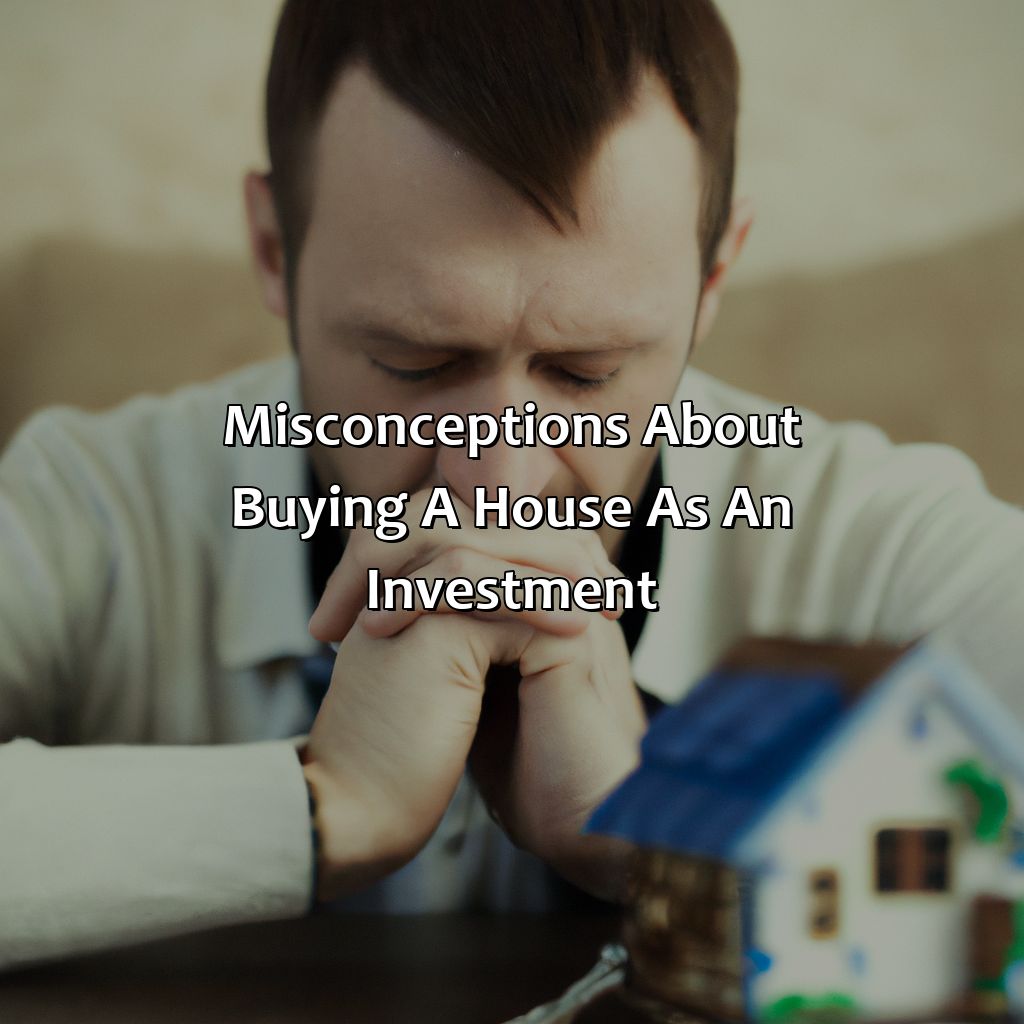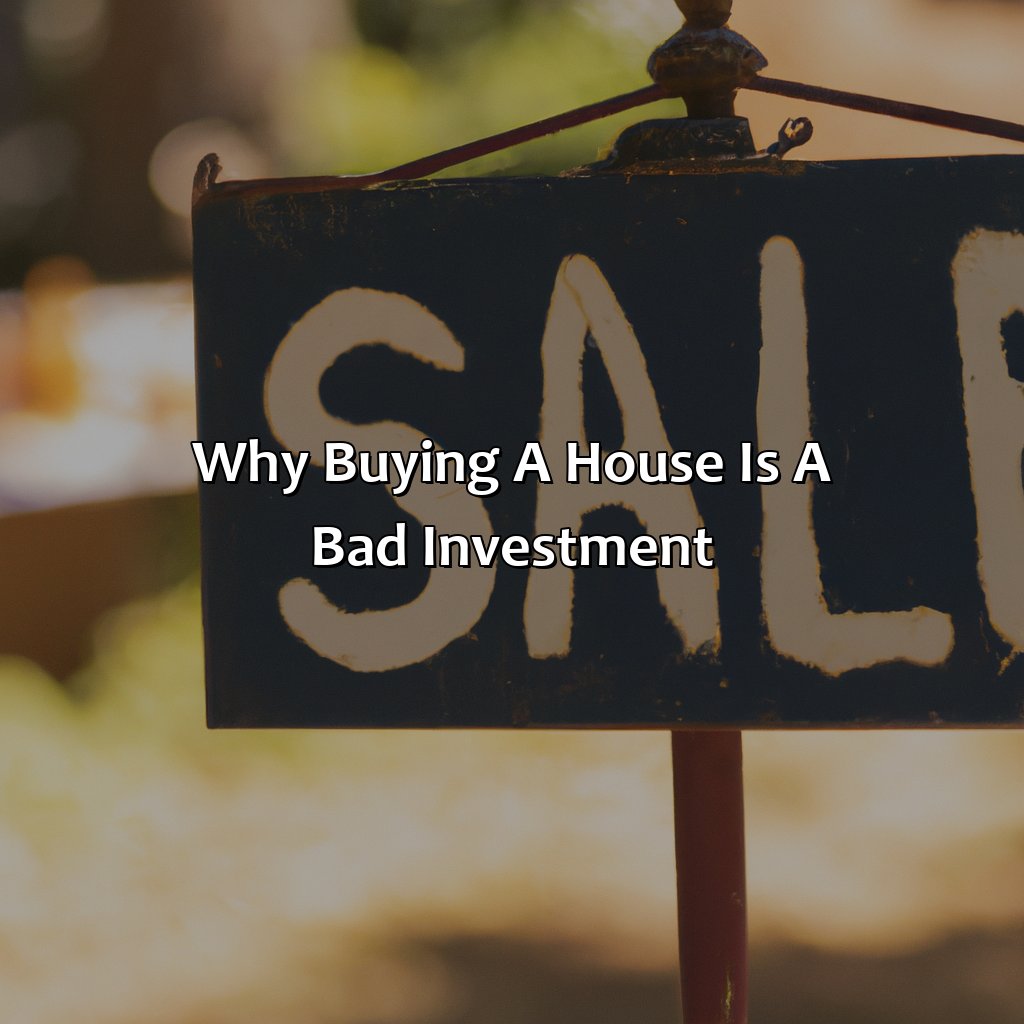Why Buying A House Is A Bad Investment?
Key Takeaway:
- Misconceptions about buying a house as an investment: While buying a house may seem like a smart investment, it comes with high costs associated with homeownership, limited potential for appreciation, and inflexibility with investment capital. These factors make buying a house a bad investment choice for some.
- Alternatives to buying a house as an investment: Investing in stocks and mutual funds, purchasing rental properties, and investing in REITs are all viable alternatives to buying a house as an investment. These options offer more flexibility and potential for higher returns than a house investment.
- Conclusion: When considering whether to buy a house as an investment, it is important to be aware of the potential drawbacks and consider alternative options that may provide greater financial benefits.
Are you considering buying a house and wondering if it’s a good investment? Find out why you should steer clear of this costly mistake and ensure financial security. You deserve to make an informed decision.
Misconceptions about buying a house as an investment
Buying a home as an investment may be misunderstood by people as a great financial choice. However, it might not be as viable as it sounds. The belief that owning a house is always profitable is not a truth.
One common misconception about buying a home as an investment is that it always appreciates in value. While this may be true for some homes, it is not the case for all. Home values could depreciate, leaving the homeowner with a significant loss. In addition, homeownership requires a significant upfront investment, including down payments, property taxes, maintenance costs, and more.
Another factor that people should consider is that investing in a house requires a long-term commitment. Unlike stocks or mutual funds, selling a house quickly may not always yield a high return on investment. It takes an extended period to realize its appreciation. Moreover, the costs associated with selling a house, such as real estate agent fees and closing costs, could offset any profit made through the appreciation.
Looking back at history, people have experienced this reality multiple times in the past. Despite skyrocketing prices, the housing market crash of 2008 left many homeowners with a significant financial loss. Thus, it is always wise to research and analyze all available options before investing in a house.

Image credits: retiregenz.com by Yuval Duncun
Alternatives to buying a house as an investment
There are Various Investment Opportunities instead of Buying a House.
The real estate market is often overpriced, making it a risky investment, especially for inexperienced investors. Instead of buying a house as an investment, there are various alternatives that investors can consider.
Investment Alternatives to Buying a House:
- Invest in the stock market: Investing in stocks can be a profitable long-term investment.
- Mutual funds: Mutual funds are a great option for investors who want to invest in a diversified portfolio.
- Real estate investment trusts (REITs): REITs allow investors to invest in a portfolio of income-producing real estate properties.
- Bonds: Bonds are a low-risk investment alternative to buying a house.
- Invest in a business: Investing in a business can generate high returns but requires careful due diligence.
- Cryptocurrencies: Cryptocurrencies are high-risk investments, but they have the potential for high returns.
Additional Aspects to Consider:
Alternative investments have different risk profiles, returns, and investment styles. It’s crucial to diversify one’s portfolio among various asset classes and investments to mitigate risk. Before investing, investors should conduct thorough research and seek professional financial advice.
Real-Life Example:
Tom was considering buying a house in the suburbs. Instead, he invested his money in the stock market. Over time, his investment in the stock market generated higher returns than a house would have, and he was able to enjoy greater liquidity. This allowed him to invest in other investment opportunities while still enjoying the benefits of his initial investment decision.

Image credits: retiregenz.com by Harry Washington
Some Facts About Why Buying a House is a Bad Investment:
- ✅ A house is not a liquid investment and can tie up your money for a long time. (Source: Reuters)
- ✅ There are many hidden costs associated with homeownership, such as maintenance, repairs, property taxes, and insurance. (Source: Investopedia)
- ✅ The housing market can be unpredictable and subject to fluctuations. (Source: Forbes)
- ✅ Renting can be a more financially sound choice for some individuals, depending on their circumstances. (Source: Time)
- ✅ A mortgage involves paying a significant amount of interest over time, potentially costing more than the initial value of the house. (Source: The Balance)
FAQs about Why Buying A House Is A Bad Investment?
Why Buying a House Is a Bad Investment?
Answer: While buying a house may seem like a good investment, it’s important to consider the potential drawbacks before making a purchase. For starters, buying a house requires a significant upfront investment, including a down payment, closing costs, and ongoing maintenance expenses. Additionally, the housing market can be unpredictable, making it difficult to guarantee a return on investment.
What are the Risks of Buying a House?
Answer: Buying a house can be risky for a number of reasons. For one, housing prices can fluctuate dramatically, leaving homeowners with a property that’s worth less than they paid for it. Additionally, unexpected maintenance expenses and repairs can add up quickly, leaving homeowners with a significant financial burden.
Is it Better to Rent or Buy a House?
Answer: Depending on your financial situation and long-term goals, renting may be a better option than buying a house. Renting allows for greater flexibility and mobility, which can be ideal for those who may need to relocate or who are not ready to commit to a long-term investment. Additionally, renting can often be more cost-effective than buying a house, especially when factoring in all the associated expenses.
How Can I Determine if Buying a House is Right for Me?
Answer: The decision to buy a house should be based on a number of factors, including your financial situation, lifestyle goals, and long-term plans. It’s important to carefully consider the upfront costs of buying a house, including a down payment, closing costs, and ongoing maintenance expenses. Additionally, it’s important to weigh the potential risks and rewards of owning property in your given market.
What Should I Consider Before Buying a House?
Answer: Before buying a house, it’s important to consider a number of factors, including the state of the local housing market, the present state of your finances, and your long-term goals. Other considerations may include the potential resale value of the property, the cost and scope of necessary repairs and renovations, and the overall affordability of the home.
What Should I Do if I’ve Already Purchased a House and Realize it’s a Bad Investment?
Answer: If you’ve already purchased a house and realized that it may be a bad investment, it’s important to take action quickly. Depending on your situation, you may be able to sell the property, refinance your mortgage, or negotiate with your lender to modify the terms of your loan. In some cases, it may be possible to rent out the property to help cover your costs while you work to improve your financial situation.


